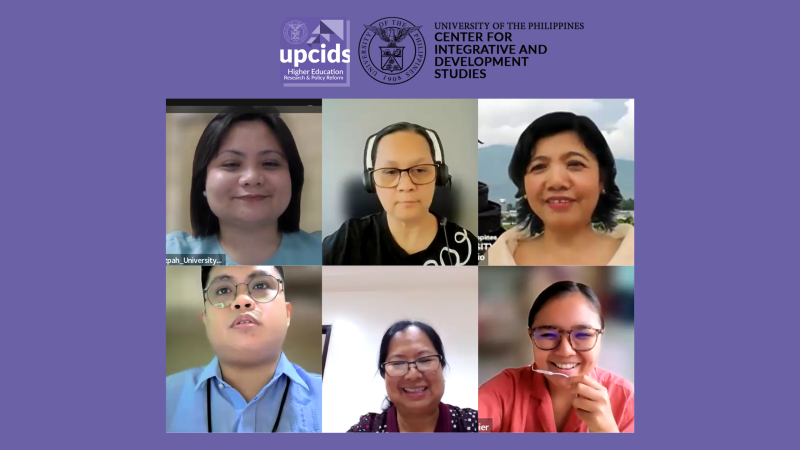UP CIDS Launches Third Run of Higher Education Brown Bag Series

By: Ms. Marie Lara Pauline B. Bobier, MAMS
The UP Center for Integrative and Development Studies (UP CIDS), through its Higher Education Research and Policy Reform Program (HERPRP), successfully kicked off the first installment of its two-part Higher Education Brown Bag Series on July 30, 2025.
Now on its third run, the series continues to serve as a platform for HERPRP fellows nationwide to share their research intentions, progress, and future directions. Anchored on the themes of Honor and Excellence, Excellence and Equity, Equity and Diversity, and Diversity and Excellence, the program highlights pressing issues and innovations in the Philippine higher education sector.
Featured Scholars and Research Presentations
- Leonardo D. Tejano, MAEd (Mariano Marcos State University) – “University Language Policies and their Impact on Students, Stakeholders, and the Community”
- Priscilla Mizpah P. Santillana, Ph.D. (University of Batangas) – “Developing the Internship Quality and Learning Index: A Framework for Evaluating and Developing Host Training Establishments”
- Jovelyn G. Delosa, Ph.D. (Northern Bukidnon State College) – “Examining how Accreditation can Enhance Student Outcomes and Continuous Quality Improvement Mechanisms”
- Juvy Lizette M. Gervacio, Ph.D. (University of the Philippines Open University) – “The Philippine AI Roadmap and its Implication to Higher Education”
In her opening remarks, Prof. Rosalie Arcala-Hall, Ph.D., Executive Director of UP CIDS, welcomed participants and highlighted the importance of the brown bag series in shaping inclusive and forward-looking higher education reforms.
Asst. Prof. Leonardo D. Tejano, MaEd, highlights that university language policies mainly prioritize the English language to promote global academic rankings and trends. However, this raises immediate concerns such as accessibility, inclusivity, and preservation of national and regional languages. Asst. Prof. Tejano seeks to examine various university language policies and how these policies affect stakeholders’ academic performance, linguistic identities, and community engagement.
Prof. Priscilla Mizpah P. Santillana, Ph.D., discusses the challenges higher education institutions face when sending internship students to host training establishments (HTE), particularly the lack of standard qualifications that the HTE should provide to ensure a better assessment of the students and maximize the transition to the real-world setting. Prof. Santillana proposes the Internship Quality and Learning Index (IQLI) as a framework that “evaluates and ranks internship providers based on key quality indicators, ensuring that students are in reputable, structured, and industry-relevant training environments.”
On the other hand, Prof. Jovelyn G. Delosa, Ph.D., shares how accreditation is crucial to higher education institutions (HEI) in reviewing the quality of service that they can offer as educational institutions. However, Prof. Delosa wants to examine how accreditation benefits stakeholders, emphasizing that it should contribute to the enhancement of student outcomes to attain student success.
Lastly, Assoc. Prof. Juvy Lizette M. Gervacio, Ph.D., explores the intersection of the use of Artificial Intelligence (AI) in higher education, particularly the AI policies of the University of the Philippines, the Philippine AI Roadmap of the Department of Trade and Industry (DTI), and UNESCO’s AI guidelines. Assoc. Prof. Gervacio aims to investigate the capacity development needs for adult scholars using Generative AI (GenAI) and recommend strategies to enhance adult scholars’ competencies in AI.
The Brown Bag Series Part 1 gathered fellows, faculty, and institutional representatives. It successfully served as a collaborative venue for research sharing and dialogue, reinforcing the interconnectedness of institutional experiences, research contributions, and policy directions, while fostering a supportive environment for fellows to refine their work.
Part 2 of the Higher Education Brown Bag Series will take place on September 10, 2025, via Zoom. Participation is free and open to all. Interested attendees may register through this link: https://forms.gle/EjmgmjjJaBAHqfFw6.